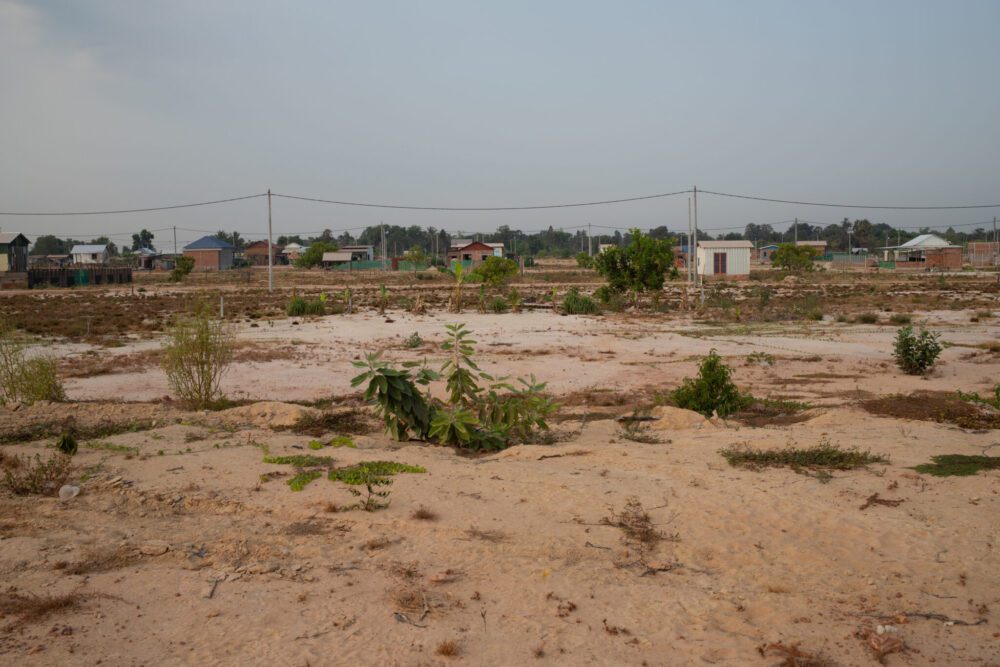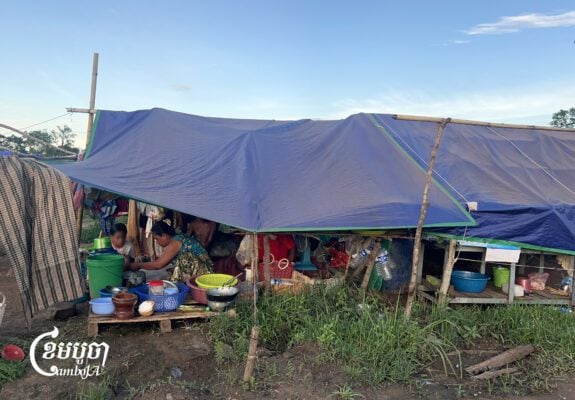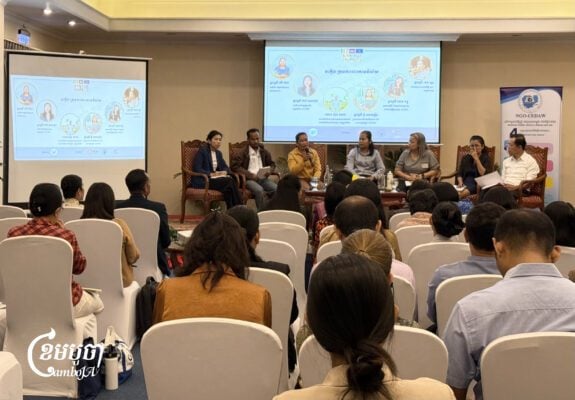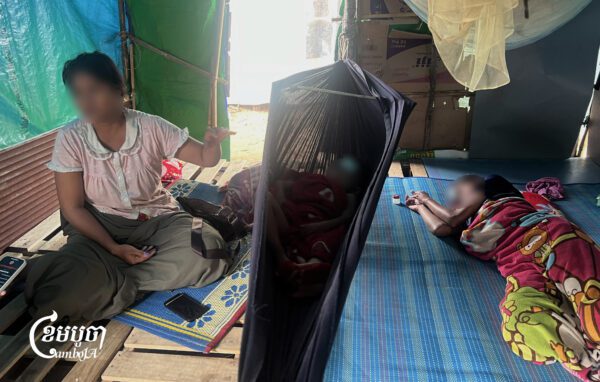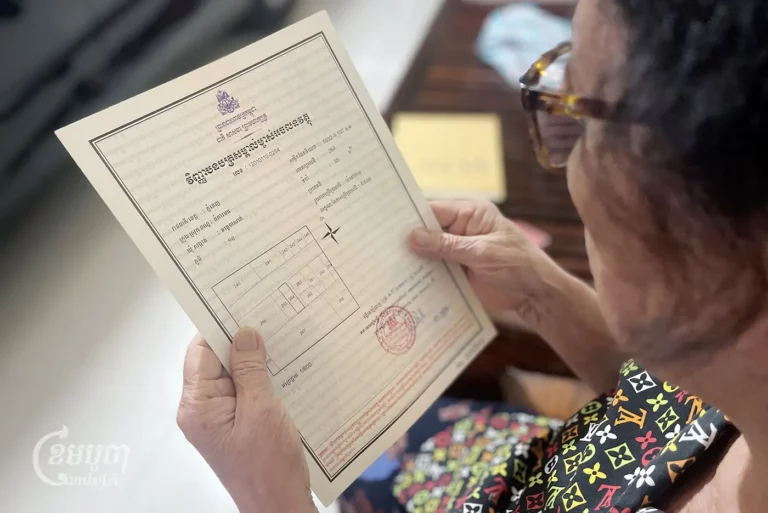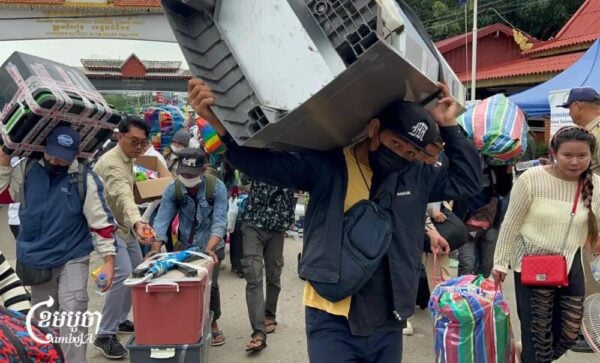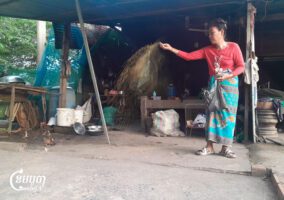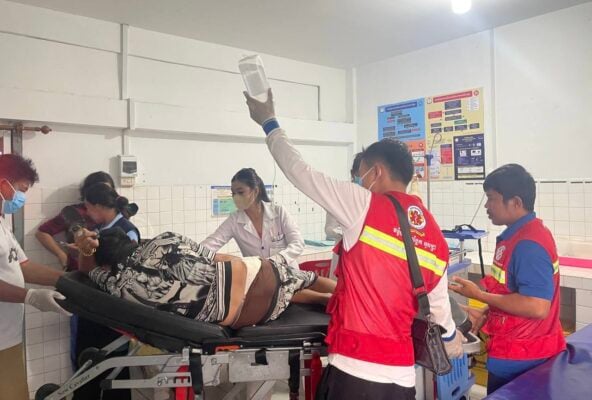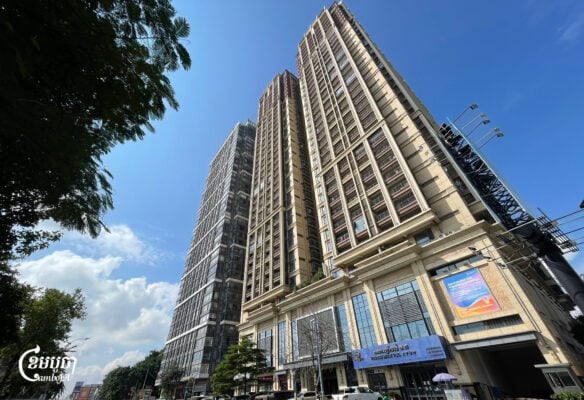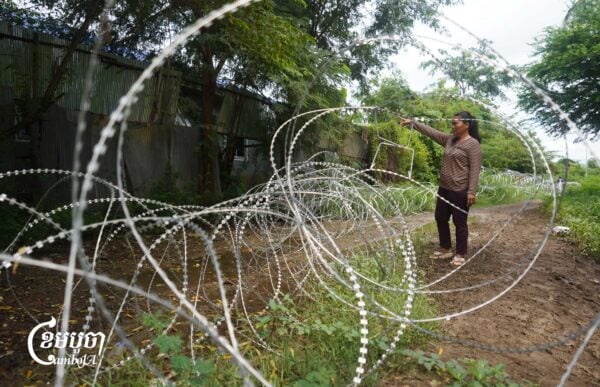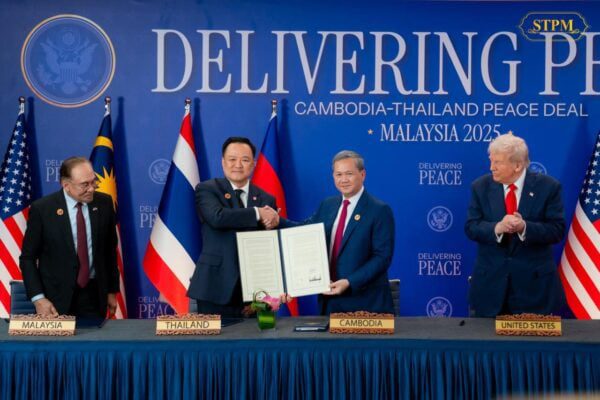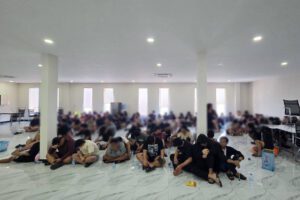Siem Reap Province: Inside the metal house, under a roof made of zinc that soaked up the sun, Mey Leakhena’s one-year-old boy couldn’t cool down.
It was late March, on the precipice of Cambodia’s historic heat wave, and the boy was sick with a fever and dehydration. Leakhena lives in Run Ta Ek, the relocation site for Angkor park evictees, where trees are few and many homes resemble metal boxes, their roofs tied down with wire.
She took her son to the local health center for a glucose drip, but he was so sick he was transferred to a Siem Reap hospital for three nights. Altogether, she borrowed 350,000 riel during his illness – about $85 she can’t afford on top of the $3,500 that she’s already in debt.
On a recent May afternoon, she stood on a Siem Reap city street, searching for a new private lender who, she had heard, would give her a lower interest rate than the 10% offered by others. She had tried opening a shop in Run Ta Ek, but like her neighbors’ businesses, it failed without any customers to keep it afloat.
“How can we continue to live like this?” said Leakhena, 36.
More than a year after the Cambodian government began evicting 10,000 Angkor Wat families to Run Ta Ek, residents of the relocation site say they are suffering a dual crisis: Extreme heat during this year’s hot season, coupled with mass joblessness that has forced them to borrow from unregulated lenders who, in some cases, are illegally holding their IDPoor cards.
The latest challenges arrive amid a Cambodian government campaign to paint Run Ta Ek as a success after Amnesty International and independent journalists documented forced evictions to the site starting in September 2022. The Unesco World Heritage Committee is expected to discuss the allegations, and the government’s response, at its next meeting in July.
Throughout April, at least 12 Run Ta Ek residents were transferred to the provincial hospital because of heat-related illnesses, according to Chhorm Panhavion, head of the Tani Health Center, with symptoms such as fevers, exhaustion, dehydration and headaches.
“It’s like that place is cremating them,” said Huy Vin, who lives outside Run Ta Ek and serves as its aja, or layperson who performs funeral rites. “When I go to funerals, I feel like I can’t breathe myself.”

‘I feel like throwing up’
Temperatures soared to historic levels across Cambodia in April. But without cooling effects from trees and vegetation, Run Ta Ek residents experienced outsized effects from the heat as their metal homes became unbearably hot.
Located about 25 kilometers northeast of Angkor park, Run Ta Ek largely comprises open, treeless areas, some of which were once agricultural fields before their stewards were forced out to make way for the new Angkor evictees.
Chhay Sokheng and Phat Phally, a married couple in their 60s, slept in a tent with no electricity during their first months in Run Ta Ek. Dirt constantly blew into their mouths and eyes from the freshly dug surroundings.
But the one-room home they live in now offers little improvement. The metal walls and roof retain so much heat they can’t fall asleep until 1 or 2 a.m., and they are still not connected to running water.
“Every afternoon, I feel like throwing up,” said Phally, who also suffers a chronic illness. “The heat makes us so sick and in pain.”
CamboJA spoke with four more people who said they experienced physical illness related to the heat and their poor living conditions. One woman, who received treatment for heat exhaustion in April, said all four of her children had been sick throughout the month.
Elderly people, children, and those with chronic conditions are at higher risk of heat-related illness and death, health officials have warned.
Two local authorities said about 10 people had died in Run Ta Ek since January, blaming reasons such as chronic illness, old age and traffic accidents. The aja Huy Vin, however, said he believed heat was impacting people’s health.
“Their shelter, it is very difficult to live there,” Vin said. “It’s just a place to end their lives … When they move there, there is nothing, and although they have houses, they’re in the middle of the sun.”
Mao Heng, Run Ta Ek commune clerk, acknowledged that “it is riskier than the old villages, because there are no older trees and no shade.”
Mass indebtedness
Families in Run Ta Ek told CamboJA they wanted to upgrade their homes to protect against the heat, and now as seasonal rains arrive, flooding. But even before being evicted from Angkor park, residents were already indebted to microfinance banks, who allowed them to use state land in Angkor park as collateral.
Now that debt crisis has deepened as residents have found few ways to make a living in Run Ta Ek.
“There’s no work,” said Roeum Sophors, a 31-year-old mother of five. “It’s so quiet here … Some people took out loans to open the shop, but people don’t have money to buy anything, so it collapses.”
Instead, people have fallen into deeper debt with unregulated lenders, using their IDPoor cards — which provide access to Cambodia’s social security system — to pay off debt. More than 10 residents said they have given their original IDPoor cards to lenders, who use them to collect the social security benefits intended for the borrower. Such practice is illegal, according to the Ministry of Social Affairs, Veterans and Youth Rehabilitation.
“Almost everyone is doing it,” said Sophors. “We put everything: IDPoor, our land titles. If we don’t do that, how can we have a house?”

Residents said they borrowed from a mix of Wing Bank agents, wealthier neighbors, and other unregulated lenders operating outside the microfinance system. A Wing agent in Run Ta Ek, speaking on the condition of anonymity, told CamboJA the practice of Wing agents holding residents’ IDPoor cards for payment was common.
“We have [agents] doing this, but as journalists, you can’t go and ask directly like this, they will not tell you the truth,” the employee said. “Just sit here [at Wing] and watch people coming to collect money, and ask them where they have put their IDPoor as collateral and how they withdraw their money.”
Touch Channy, spokesperson for the Ministry of Social Affairs, Veterans and Youth Rehabilitation, emphasized that such arrangements are illegal. A working group had previously looked into cases in Run Ta Ek, but he was not aware of updates.
“This is illegal,” Channy said. “This is not right, and IDs are not allowed to be sold, or transferred, or placed as collateral.”
“How can we blame [the borrowers], because their condition is difficult and poor and they need money urgently,” he added.
In an emailed statement, Wing Bank’s CEO Han Peng Kwang said the bank was not aware of the specific situation in Run Ra Ek but that “we are aware that informal lending practices exist in various communities in this country.” Bank policy is to only accept land and buildings, cash, and debentures as collateral; all other documents, including IDPoor, are not acceptable, he said.
“However, it is essential to emphasize that Wing agents are third-party entities, distinct and separate from Wing Bank itself,” Han Peng Kwang wrote, adding: “Wing agents, as independent entities, operate autonomously, and their actions may not always align with our official policies. We have established policies and rules to maintain control over our agents. If we discover any rule violations, we will take disciplinary action in accordance with our policies, including contract termination.”
Four Siem Reap officials confirmed they were aware of the lending practices in Run Ta Ek.
“Some who are desperate must [use IDPoor cards like this] to solve their problem,” said the commune police chief Kong Ken, noting it also caused administrative problems. “In Run Ta Ek, there is no occupation for them to do, so they do that to get some money.”
Left to rent rooms instead
Ly Vannak, director and spokesperson for the Siem Reap Provincial Administration, warned lenders against holding IDs and said he was “concerned about [borrowers’] economic challenges in the future.”
“We will try to build jobs and the economy … for development on the site to help them and to help them to get jobs and make other revenue,” he said.
Such accounts contrast with the official Cambodian government narrative of Run Ta Ek. Last November, after Amnesty International released an investigation with findings of forced relocations and inhospitable conditions at Run Ta Ek, the government defended the site and said the allegations were “political.” Still, Unesco asked Cambodia to expedite a report on Angkor conservation.
The subsequent January 30 report described the relocation site as a “success” with “sufficient natural resources” that provides a “place of dignified human habitation.” The World Heritage Committee plans to discuss it in July in New Delhi.

As of May, Run Ta Ek was dotted with padlocked metal homes, left empty with phone numbers scrawled on the outside. Un Saloeut, the chief of Run Ta Ek’s Tani village, estimated that up to one-third of people have left to rent rooms in Siem Reap or live elsewhere with family.
One man, a 38-year-old tuk-tuk driver named Ang Pisey, could not afford to live in Run Ta Ek in the first place. After taking out a loan in 2019 to build a house on his parents’ ancestral land in Angkor park, he was evicted, and is still stuck paying back nearly $300 monthly on the destroyed property.
He would like to build a home in Run Ta Ek, Pisey said, but people are already leaving.
“The living conditions there, it’s just too difficult,” he said. “The water and electricity, now, those are okay. But the most important thing is income. If you don’t have income, how can you do anything?”


